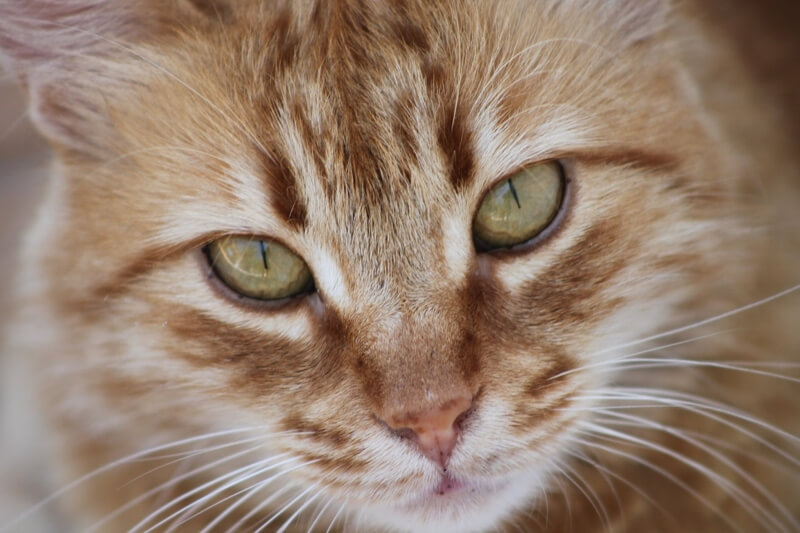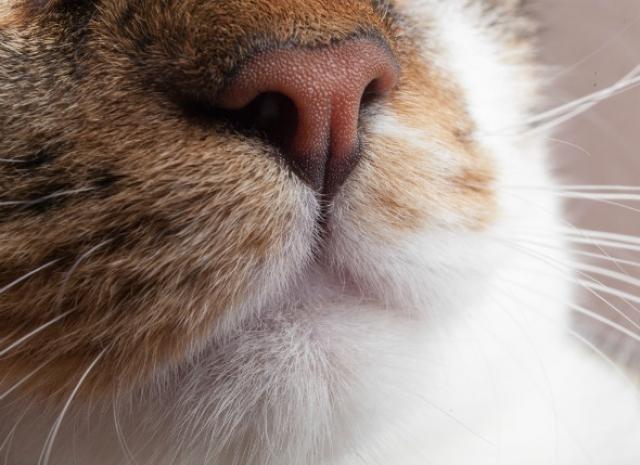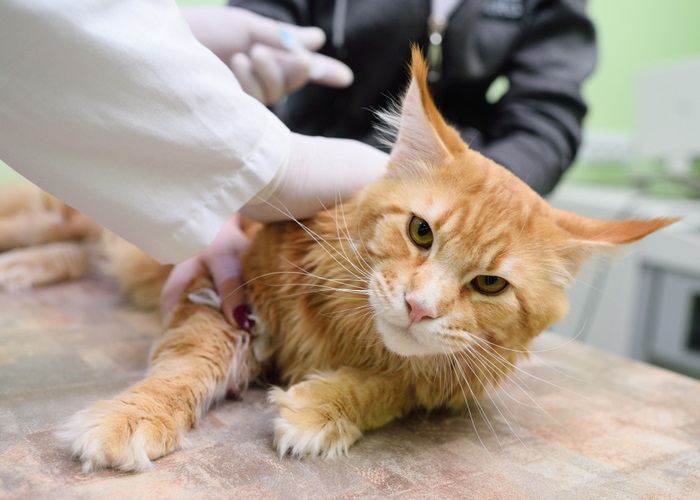nasal lymphoma in cats symptoms
This can help shrink the tumor improving the cats quality of life and allowing chemotherapy to be more effective. Lymphoma of the chest mediastinal lymphoma causes respiratory symptoms.

Understanding Lymphoma In Cats
Symptoms of feline nasal lymphoma multicentric feline nasal lymphoma attacks the lining of the nasal cavity.

. Symptoms of lymphoma in cats since lymphoma can occur in various parts of the body including the liver spleen and lymph nodes symptoms may vary depending on the location of the cancer. Ten cats displayed multiorgan involvement and i. Get the pawfect insurance plan for your pup.
Life Expectancy Thankfully the most common type of feline lymphoma intestinal lymphoma is often low-grade. Ad Help your pet cope with symptoms like nausea loss of appetite and energy. Symptoms of Nasal Lymphoma in Cats.
Nasal tumors are found in the nasal cavity and the paranasal sinuses and affect cats. Get NHVs most useful pet cancer supplements in one holistic pack. Symptoms of nasal lymphoma can sometimes be scarce.
The most common types of nasal tumor are either a carcinoma or lymphoma which are. Symptoms depend on how advanced the growths have become but may include. Middle to older aged cats are most commonly diagnosed with nasal cancer.
Lack of interest in normal activities. The most likely location for nose and sinus cancer to spread is to the brain or lymph nodes. From 336 quotes ranging from 3000 - 10000.
Its a cancerous infection of the lymphocyte cells and is one of the few cancers that is localized and thus easier to treat. Unlike the symptoms of liver cancer symptoms of nasal cancer will seldom mimic symptoms of other conditions. After Jones the cat was diagnosed with nasal lymphoma at the NC State Veterinary Hospital antibiotics and steroids werent going to be enough.
Thus unlike other forms of lymphoma where systemic chemotherapy is the treatment of choice nasal lymphoma often responds well to local. In about a quarter of cases of nasal lymphoma the cancer has spread to other parts of the body. Other infrequent symptoms are diplopia or blurred vision and nasal or cheek pain.
14 19 Nasal lymphoma is reported as generally restricted to the nasal cavity. The most common types of nasal tumors in cats are squamous. Nasal lymphoma is a cancer of a type of white blood cell called a lymphocyte.
The most common presenting symptoms of sinonasal lymphomas are nasal obstruction epistaxis headache and unilateral facial cheek or nasal swelling 1 7 16 17. The general symptoms in all cases are apathy weight loss and eating problems. Nasal Lymphoma Nasal lymphoma affects the nose of cats and usually starts as a facial swelling.
It also cannot be passed to other animals in a household including dogs lizards birds and other exotic animals so dont worry if one. Other times symptoms are very pronounced. Sometimes even a fighter like Jones needs a little help.
However the effect of single-agent chlorambucil on nasal or nasopharyngeal lymphoma has not been evaluated in cats. Nasal tumors are less common in cats than in dogs making up about 1 of tumors in cats. Miscellaneous Lymphoma Types In Cats.
In our study the 5 year survival rate for sinonasal lymphomas was 50. If your cat has neurological symptoms nervous system involvement you may notice changes in behavior difficulty in walking and fits. Intestinal Lymphoma in Cats.
What is a feline nasal lymphoma. When your cat has this disease its important to recognize and understand the end stages and to. Treatment for a cat that has been diagnosed with lymphoma the most frequently diagnosed among all types of feline cancer relies primarily on.
Nasal tumors and nasopharyngeal tumors reflect different symptoms. Regardless of the site some symptoms are common to all lymphomas. To date no specific breed or sex predisposition has been noted.
Lymphoma in the nasal cavity is the most common tumor of cats upper respiratory tract. Nose and Sinus Cancer Average Cost. Feline lymphoma or lymphosarcoma is the most common form of cancer in cats.
Generally speaking the life expectancy is between 4 weeks to 2 years. Symptoms of nasal cancer in cats can remain concealed for as long as five years until the disease presents itself as a serious threat. In some cases radiation therapy may be recommended in addition to chemotherapy.
Nasal tumors are relatively uncommon in veterinary medicine accounting for less than 1 of all feline tumors. Its highly treatable but incurable. This form of multicentric feline cancer generally is caught late and by that point chances of a cats survival are low.
Vet bills can sneak up on you. The most affected area is usually the nasal cavity and this variant is accompanied by strange secretions and difficulty breathing. Nasal lymphoma is the most common nasal tumor in cats exceeding other neoplasms and inflammatory diseases in recent studies.
It is a unique type of lymphoma in that the tumor often remains confined to the nasal cavity. An 8-year-old castrated male Scottish Fold weighing 35 kg presented with an 8-month history of nasal discharge sneezing and mild epistaxis. Continue reading Feline Nasal Tumors.
It is most common in felines between the ages of 5 and 9. Feline nasal lymphoma cannot be transmitted cat-to-person or even cat-to-cat. Eventually the disease will be fatal.
Systemic spread is only occasionally reported. Most cats develop feline nasal lymphoma when they are young. Life expectancy of cats with lymphoma depends on many factors such as where the cancer is and how early it was diagnosed and treated.
8 12 14 19 A discrepancy in immunologic characterization of feline nasal lymphoma has been noted. Lymphoma in the nasal cavity is the most common tumor of cats upper respiratory tract. Fifty cats were diagnosed with lymphoma at necropsy via biopsy or by cytology alone.
Lymphoma is the most common nasal cavity tumor in cats yet few reports specifically address the anatomic immunohistologic and cytologic features of this neoplasm. There are also less common forms of lymphoma affecting the nerves the lymph nodes or other sites in the body. Difficulty breathing through nasal passages.
Feline lymphoma is a malignant cancer of the lymphatic system the exquisitely structured arrangement of internal organs and tissues that directly or indirectly influences virtually every aspect of a cats physical existence. Respiratory distress is typical of mediastinal lymphoma. Nasal lymphoma in cats is treated primarily with chemotherapy just like other forms of feline lymphoma.
Here are some things to watch for. However the effect of single-agent chlorambucil on nasal or nasopharyngeal lymphoma has not been evaluated in catsAn 8-year-old castrated male Scottish Fold weighing.

Living A Healthy Life With Feline Leukemia Kitten Hunter Ray S Happy Tail Feline Leukemia Feline Cat Mom

Lymphoma In Cats Great Pet Care

Understanding Lymphoma In Cats

Lymphoma In Cats Atlantic Veterinary Internal Medicine

Cancer Lymphoma In Dogs And Cats

Nasal Cancer In Cats Advanced Radiation Therapy Treatment For Dogs Cats With Cancer Petcure Oncology

Nose And Sinus Cancer Squamous Cell Carcinoma In Cats Petmd

Lymphoma In Cats Symptoms Diagnosis Treatment All About Cats
